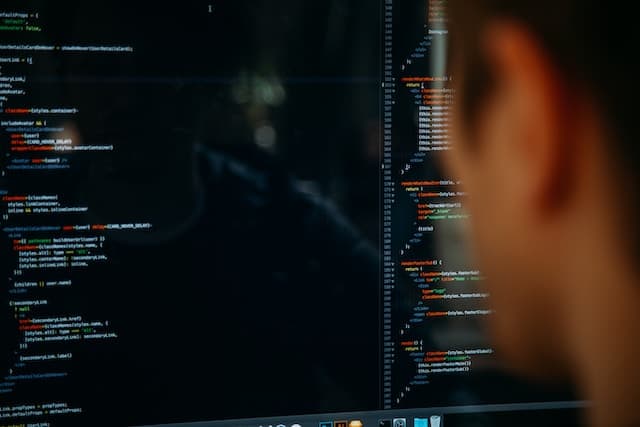Unlock the boundless potential of Full Stack Web Development. Join the highly regarded Full Stack Web Developer Nanodegree. In this digital landscape, the demand for versatile coders continues to soar. Udacity, Coursera, and other platforms provide this type of course. This equips students with the skills necessary to excel in this dynamic field. This empowers you to build amazing web apps with theory and hands on experience.
We are living in a competitive job market. Companies seek professionals capable of bridging the gap between design and functionality. That makes web development an invaluable skill set. Through a carefully curated modules, students delve into the intricacies of front end techs.
They are also mastering server side programming languages, database management, and API integration. With real world projects and a capstone experience, students gain invaluable practical knowledge. With that, they can create an impressive portfolio that sets them apart from the crowd.
Know Full Stack Web Development

The web development realm confines a vast array of technical expertise and responsibilities. At the forefront of this dynamic field is the full stack web developer. It is Armed with a comprehensive skill set. That spans both the front end and back end aspects of web development.
We will delve into the definition and components of full stack web dev. We will also explore the role and responsibilities of a full stack web developer. You will know the important skills and techs required to excel in this domain.
What is Full Stack Web Development?
Full stack web dev encompasses front end and back end aspects. It covers all layers of web applications. It deals with user facing elements such as the user interface and interactions. Full stack development also deals with the back end. It focuses on server side coding, databases, and data management. The full stack encompasses a series of interconnected components. It forms a cohesive ecosystem that powers modern web applications.
Role and Responsibilities of a Full Stack Web Developer
A full stack web developer is a versatile professional. He possesses the knowledge and expertise to handle all aspects of web development. Their role involves conceptualizing and designing user interfaces. It executes client side functionality using HTML, CSS, and JavaScript. It also develops server side logic and APIs integrating databases. As a result, it ensures smooth deployment and maintenance of web applications.
As a full stack developer, you bridge the gap between the front end and back end. It ensures seamless communication and functionality across all layers of the application.
Skills and Technologies Required for Full Stack Web Development
To succeed as a full stack web developer, proficiency in various skills and techs is crucial. This includes strong command over front end techs. For example, HTML, CSS, and JavaScript frameworks. They also need to be an expert in server side coding languages. They use Python and SQL to include database logic and make websites.
Understanding web master relational databases and SQL or NoSQL techs is important for efficient data management. You should have knowledge of version control systems, cloud platforms, and deployment tools. This enables full stack coders to implement scalable and robust solutions.
The Full Stack Web Developer Nanodegree
Udacity and Coursera, Bloc, and others offer the Full Stack Web Developer Nanodegree program. They designed it to equip aspiring coders with the skills and knowledge. This comprehensive program provides a structured module. It also provides hands on projects and industry recognized certification. That makes it an ideal choice for individuals. Some Udacity full stack web dev course reviews say this is the best course. You can start with freecodecamp full stack web development course as they provide a degree.
Curriculum and Course Structure

Core Concepts Covered in the Program
The Nanodegree program delves into many core concepts. These are important for mastering web development. Learners explore front end techs like HTML, CSS, and JavaScript. They gain expertise in building user friendly interfaces and interactive web applications. They also delve into back end techs. For example, server side coding languages (e.g., Python, JavaScript). They learn to develop robust APIs and handle data management using databases.
Practical Projects and Hands on Experience
The program provides hands on experience. It provides students with opportunities to apply their knowledge through practical projects. These projects simulate real world scenarios. It allows students to build interactive web applications. They can develop REST API and create database driven web solutions. By working on these projects, students gain valuable experience. They can reinforce their understanding of the concepts learned throughout the program.
Collaboration and Community Support
Udacity’s Full Stack Web Developer Nanodegree program offers collaboration. It supports through plces like Udacity Connect and Coursera forums. Learners can connect with peers and engage in discussions. They can seek advice from experienced mentors and instructors. This collaborative environment fosters a sense of community. It enables students to learn from one another, share intuition, and overcome challenges together.
Benefits and Advantages of Enrolling in the Full Stack Web Developer Nanodegree Program
Industry-Recognized Certification
Completing the Full Stack Web Developer Nanodegree program from reputable online platforms provides students with an industry recognized certification. This certification serves as a testament to their skills and knowledge. It validates their expertise in full stack development. It enhances their credibility and increases their chances of securing rewarding job opportunities.
Career Support and Networking Opportunities
Enrolling in the Web Developer Nanodegree program offers valuable career support. It also opens networking chances. Platforms like Udacity and Coursera offer resources. For example, career services, job boards, and networking events. It enables students to connect with industry professionals and potential employers. Access to alumni networks further enhances networking possibilities. That provides a supportive community of fellow coders.
Real-World Project Experience
One of the significant advantages of the Web Developer Nanodegree program is the opportunity to gain real world project experience. By working on practical projects, students acquire many skills. As a result, they can tackle complex web dev challenges. They build a portfolio of projects that showcases their abilities. It allows them to demonstrate their expertise to potential employers and clients.
Course Highlights and Learning Objectives
Front-end Development
Front-end development plays a crucial role in creating visually charming web experiences. The Web Developer Nanodegree program offers comprehensive training in front end development. It equips students with the following skills:
Mastering HTML, CSS, and JavaScript Fundamentals
Through hands on exercises and projects, students gain a foundation in coding languages. It enables them to build well structured web pages and implement dynamic functionality.
Understanding UI/UX Design Principles for Enhanced User Experience
Learners delve into user interface (UI) and user experience (UX) design principles. They can create intuitive and charming interfaces with it. They learn to optimize usability and create standard visually appealing designs.
Implementing Responsive Web Design Techniques
With the increasing use of mobile devices, responsive web design has become important. Students learn how to create websites that seamlessly adapt to different screen sizes. It can improve the user experience across various devices.

Programmer typing code to build front end
Back-end Development
Back-end development focuses on the server side logic and data management aspects of web apps. This program empowers students to include cloud based machine learning techniques. The Full Stack Web Developer Nanodegree program provides comprehensive training in back end development. It covers the following areas:
Exploring Server-side Programming Languages
Learners gain exposure to server side coding languages like Python, JavaScript, and others. They learn how to handle server side processing. They also know how to execute business logic to create robust web apps.
Learning about Databases and Data Modeling for Efficient Data Management
Understanding databases and data modeling is crucial for efficient data management. Students learn to work with databases, design schemas, and implement effective data models for seamless storage and retrieval of information.
Integrating and Developing APIs to Enhance Web Application Functionality
Application Programming Interfaces (APIs) enable communication. It integrates between different components of a web application. Students learn to develop and integrate APIs to enhance functionality. That allows data exchange and interaction with external services.
Deployment and DevOps
Efficient deployment and DevOps practices are vital for maintaining and scaling web apps. The Full Stack Web Developer Nanodegree program covers the following topics related to deployment and DevOps:
Utilizing Version Control Systems for Efficient Code Management
Version control systems like Git enable coders to manage code efficiently. Students learn to use Git to track changes, manage branches, and aid with other developers on their projects.
Leveraging Cloud Platforms for Scalable Web Application Deployment
Cloud-based solutions have revolutionized web application deployment. Students gain hands on experience with cloud platforms like AWS, Azure, and others. They can learn how to deploy their applications scalable and cost effectively.
Implementing Continuous Integration and Deployment Practices for Efficient Development Workflows
Continuous Integration (CI) and Deployment (CD) practices streamline the development workflow. It can ensure high quality software delivery. Students learn to automate build processes, run tests, and deploy applications seamlessly. As a result, it fosters efficient and reliable development practices.
Hands-on Projects and Capstone
Projects Included in the Full Stack Web Developer Nanodegree
Hands-on projects simulate real world scenarios in the Full Stack Web Developer Nanodegree program. These projects allow students to apply their acquired skills and knowledge in practical settings. The following are some of the projects included in the program:
Building Interactive Web Applications
Students are tasked with creating interactive web apps that include front end techs. For example, HTML, CSS, and JavaScript. They learn to design user friendly interfaces and implement dynamic features. This can enhance user engagement.
Developing RESTful APIs
In this project, students focus on developing RESTful APIs using server side programming languages. They gain skills in handling HTTP requests and designing API endpoints.
Creating Database-Driven Web Applications
This project creates web apps. It can interact with databases for data storage and manipulation. They gain hands on experience in working with databases and implementing operations.
The Capstone Project, Demonstrating Integration of Front-end and Back-end Skills

Instructor taking class in a web development nanodegree program
The capstone project is the pinnacle of the Full Stack Web Developer program. It showcases students’ skills in all aspects of web dev. This comprehensive project requires students to build a web application from scratch. It integrates both front end and back end skills. The capstone project highlights the following:
Building a Complete Web Application from Scratch
In the capstone project, students can create a fully functional web application. They conceptualize, design, and implement the entire application. It encompasses front end interfaces, back end logic, database integration, and deployment.
Showcasing Skills in All Aspects of Full Stack Web Development
The capstone project serves as a culmination of the skills and knowledge acquired throughout the program. It demonstrates students’ ability to integrate front end and back end techs seamlessly. It also shows apply object oriented Python programming principles. You can use best practices in web dev.
Working on the capstone project, students gain valuable experience in the end to end development process. That includes project planning, architecture design, execution, testing, and deployment. This project solidifies their understanding of full stack web development. It also gives them a large portfolio piece to show their skills to potential employers.
Job Placement and Career Opportunities
Demand for Full Stack Web Developers in the Job Market
The job market is currently experiencing a significant demand for skilled coders. Companies in diverse industries value full stack developers as technology continues to advance. By completing the program, you can tap into this growing demand. You can explore a wide range of exciting career chances.
Diverse Career Paths and Industries for Full Stack Web Developers
One of the key advantages of becoming a full stack web developer is its versatility for career paths and industries. Companies in virtually every sector need web dev expertise. That makes coders highly sought after. The Nanodegree program opens doors to diverse chances in startups and freelancing.
Web developers are in demand across industries. That includes e commerce, healthcare, education, and entertainment. As a full stack web developer, you can help to developing websites and apps solutions. It allows you to explore different domains and apply your skills in diverse settings.
Essential Skills and Qualifications Sought by Employers
Employers value specific vital skills and qualifications when hiring developers. These include skills in front end techs. For example, HTML, CSS, and JavaScript. This also involves expertise in back end development using coding languages. Employers also seek individuals with some experience. For example, database management, API integration, and responsive web design.
In addition to technical skills, employers often look for strong problem solving abilities. They also look for attention to detail and the ability to work well in a team. Effective communication and project management skills are also highly valued. This can help to successful collaboration and efficient project delivery.
Job Placement Assistance and Career Support

The Full Stack Web Developer Nanodegree program equips you with the necessary skills. They also provide job assistance and career support. That can help you succeed in the industry. Through the program, you can access valuable resources and tools. These tools can enhance your job prospects. These may include resume reviews, interview preparation advice, and career counseling sessions.
Moreover, the program often builds partnerships with industry leaders. It offers networking chances and connections with potential employers. Alumni networks and online groups are specific to the Full Stack Web Developer Nanodegree program.
It further facilitates collaboration and job chances. You can maximize your growth and pave the way for a successful career as a software engineer.
Tips for Success in the Full Stack Web Developer Nanodegree
Effective Study Techniques and Time Management Strategies
Maximize your Web Developer experience with effective study techniques and time management. Here are some tips to help you succeed:
Establish a Study Routine
Create a consistent study schedule that suits your lifestyle. Dedicate specific blocks of time each day or week to focus on the program materials. Consistency is key to making steady progress.
Break Down the Curriculum
The Full Stack Web Developer Nanodegree modules can be lengthy. Break it down into smaller, manageable sections or topics. Set goals for completing each section, ensuring steady progress without feeling swamped.
Practice Regularly
Full stack web development requires hands on practice. Set aside time to work on coding exercises, projects, and assignments. Regular practice will strengthen your skills and reinforce concepts.
Utilizing Extra Resources and Learning Opportunities
In addition to the core program materials, take advantage of extra resources and learning chances. These resources can enhance your understanding. It can also expand your knowledge as a full stack web developer. Consider the following:
Supplementary Materials
Explore supplementary materials such as articles, lessons, and documentation available on the platform. These resources can provide extra insights. It can help to deepen your understanding of specific topics.
Online Courses and Specializations
Various platforms offer a wide range of online courses and specializations. Consider joining in relevant courses. As a result, you can complement your Full Stack Web Developer Nanodegree.
Engage with the Online Community
Interacting with fellow students and industry professionals can provide valuable insights and support. Participate in Full Stack Web Developer Nanodegree forums, discussion boards, and online groups. Share experiences, seek advice, and aid with others.
Networking and Engaging with the Online Community
Networking and charming with the online community are crucial aspects of your journey as a Full Stack Web Developer. Here’s how you can make the most of platform specific resources and forums:
Join Platform-Specific Communities
Many platforms often have dedicated groups for students joined in the program. Join these groups to connect with peers, share ideas, and seek advice. Engaging with others can enhance your learning experience.
Attend Virtual Events and Webinars
Look for virtual events, webinars, and workshops the platform or industry experts organize. These events offer chances to learn from professionals and network with fellow students.
Collaborate on Projects
Many Full Stack Web Developer Nanodegree programs encourage aiding on projects. Seek chances to work with other students on group assignments or side projects. Collaborative work exposes you to different perspectives. It can improve work skills and broadens your network.
Networking and charming with the online community can open doors to potential collaborations. It provides job chances and mentorship. Actively take part in discussions, and ask questions. Contribute your knowledge and insights to build yourself as an engaged and valuable community member.
Conclusion
The Full Stack Web Developer Nanodegree program offers a comprehensive learning experience. It equips individuals with the skills needed to thrive in web development. It helps students to prepare for diverse career challenges with a focus on front end and back end techs.
By mastering HTML, CSS, JavaScript, and server-side programming languages, students gain the foundation. It is necessary to build dynamic and responsive web apps. The hands on projects and aiding chances provide practical experience. It can foster a sense of community among students.
